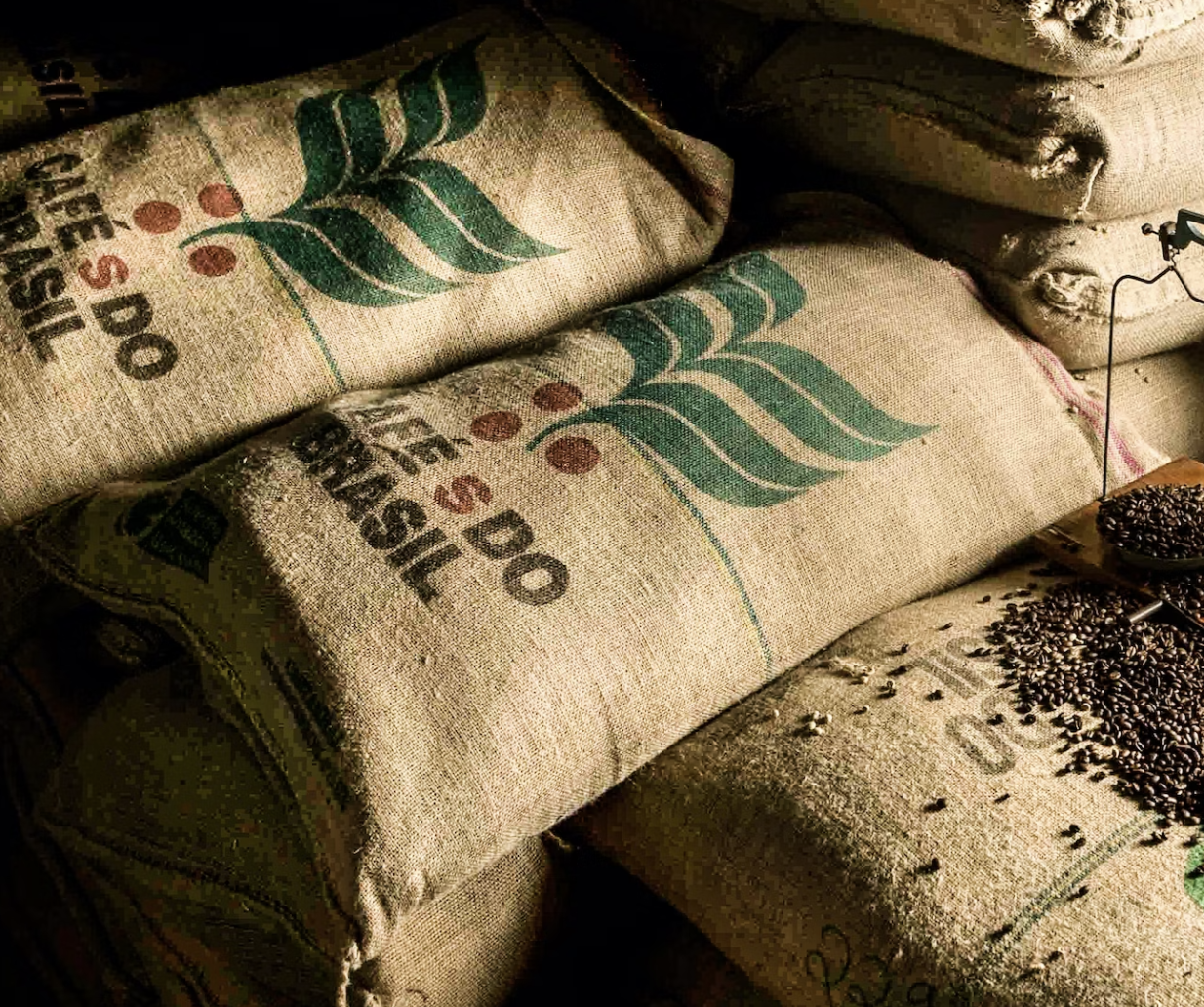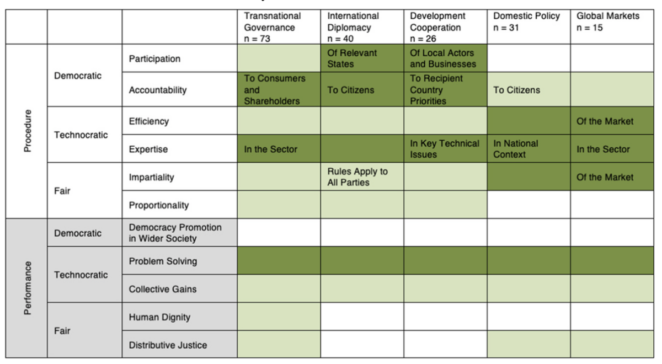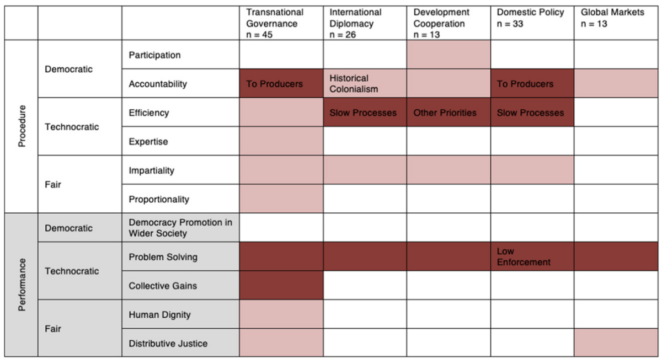Contesting legitimacy in global environmental governance – An exploration of transboundary climate risk management in the Brazilian-German coffee supply-chain

Introduction
Stronger interconnections between people, ecosystems and economies in a globalized world are changing the scope and nature of global environmental governance. One area where this is becoming increasingly evident is climate change, where there is a growing recognition that climate risks can be transboundary in nature, crossing international borders as people, goods, and capital do. This suggests that a multiplicity of actors – state and non-state – have plausible claims to be engaged in or responsible for the governance of transboundary climate risks.
However, it is presently unclear on what premises a global governance institution to do so might be constructed and the roles various actors may play therein. This absence of established roles and norms creates a space for political contestation with legitimacy at its center. In this paper, the authors unpack the contested nature of legitimacy by examining the governance of TCRs in agricultural supply-chains. This paper has two key objectives:
- To explore the theoretical propositions about the sources of legitimacy and consider them in an empirical context. It demonstrates how actors are deploying competing claims for legitimacy to advance and shape contested visions of global environmental governance. It identifies patterns in how the sources of legitimacy are deployed, reflecting different and competing visions for TCR governance.
- To broaden the understanding of TCRs as an emerging governance challenge. Presently, there are no internationally agreed frameworks, policies, or regulations for governing TCRs, nor is there consensus about which policy regimes or actors should be tasked with developing and implementing them.
This article is an abridged version of the original text “Contesting legitimacy in global environmental governance – An exploration of transboundary climate risk management in the Brazilian-German coffee supply-chain” published in Earth System Governance, 15, under the CC BY-NC-ND 4.0 license in January 2023 © Dzebo and Adams. Please note that references have been removed.For more detail, full references, and to quote text please use the paper available for download on the right.
Methodology
Case study:
In this paper, the authors empirically explore competing claims for legitimacy for a specific case where the governance of TCRs is actively unfolding: the Brazilian-German coffee supply-chain. Brazil is one of the largest and most climate-vulnerable coffee exporters in the world while Germany is both a major coffee consumer and re-exporter.
Data collection:
In order to empirically explore the contestation of legitimacy in the governance of TCRs this research study draws on an extensive stakeholder mapping of the Brazilian-German coffee supply-chain, including coffee producers, cooperatives, traders, roasters, and retailers, as well as relevant sustainability initiatives, certification schemes, government ministries and agencies, trade associations, civil society organizations and researchers. Employing a snowball sampling technique, the authors conducted 41 semi-structured interviews (21 in Brazil, 16 in Germany and 4 international) with 65 experts, decision-makers and practitioners during field visits to Brazil and Germany (January 2020 and March 2019, respectively).
Interviews focused on professional responsibilities, the relevance of climate change to respondent’s work, effectiveness in current climate risk management, which actors were best placed to manage TCRs and why, as well as the role of global and national partnerships in order to gather the views of respondents on which actors and governance processes were perceived as legitimate and why.
In order to study competing claims for legitimacy, a textual analysis was conducted, which identified “legitimacy claims” throughout the corpus of interview material. The authors identified 315 unique (de)legitimation claims where interviewees explicitly or implicitly advanced or challenged the authority of an actor/institution, group of actors/institutions or governance arrangements as appropriate for TCR governance. Based on this database, authors then structured the results through an aggregation of actors and policy mechanisms identified, as well as the varying deployment of legitimacy sources, to identify the primary modes of governance being considered by interviewees for the governance of TCR and their respective normative foundations.
To read about the methodology in depth, please refer to pages 4-5 of the full paper.
Governing transboundary climate risks: Five pathways and the sources of their legitimacy
In the Brazilian-German coffee supply-chain, interviewees collectively described five distinct governance pathways for TCRs, where the purpose of governance activities (or lack thereof) is to incentivize behavioral change:
- In the first pathway ‘transnational governance’, activities are dominated by the private sector through e.g., private certification schemes, insurance, sustainability initiatives or corporate social responsibility and, to some extent, public-private partnerships.
- The second pathway, ‘international diplomacy’ mainly engages sovereign states, who negotiate as equals to jointly agree on international rules and regulations intended to benefit both parties, either through bilateral engagement or under the guise of international organizations and clubs.
- In the third pathway, ‘development cooperation’, TCR governance is achieved through development and climate finance support from donor countries

In addition, the study presents two pathways suggested by interviewees where the governance of TCR itself is delegitimized:
- ‘Global markets’, where consumer preferences should govern market signals and where other intervention is unwarranted; and
- ‘Domestic policy’, where the public sector is wholly responsible for governance mechanisms for national and local adaptation within national borders.

The primary distinctions between governance pathways are the policy mechanisms employed in each instance, the relationship between key actors involved and the normative basis for their perceived legitimacy as an appropriate institution for the governance of TCRs.
To explore the TCR governance pathways in more detail please refer to pages 5-8 of the full paper.
Discussion and Conclusion
As few studies have been conducted which explicitly engage with the governance of TCRs, this paper proposes an empirically driven framework of five pathways which are being actively explored, negotiated, and contested in the Brazilian-German coffee supply-chain. While the proposed pathways are not necessarily exhaustive nor mutually exclusive, and the balance between them in any case will be contextually specific, the authors contend that the pathways may be generalizable to other supply-chains, issues in global environmental governance, or for foreign affairs more broadly.
- The transnational governance pathway assigns strong weight to the private sector’s ability to effectively govern TCRs. However, this pathway is the closest to business-as-usual for the sector, and the institutional initiatives on which it heavily relies have been shown to be insufficient for effective sustainability outcomes.
- Second, to presume that international diplomacy occurs between truly equal states would be to overlook decades of research on international political economy, power, and the various forms of coercion which are commonplace in global environmental governance and foreign affairs.
- Third, while it is consistently implied that development cooperation is a benevolent exercise driven by a recipient country, a wealth of literature in development studies and development aid would call this in to question.
- Lastly, neither domestic policy nor global markets pathways make any efforts to actively govern TCRs across borders, either allowing for autonomous adaptation entirely at the domestic level, or mediated solely through market forces.
- In short, among all three of the pathways with the highest ambition for international cooperation, serious questions exist about the accuracy of their premises.
The findings highlight a need to better account for global and transnational governance of adaptation and climate risk. There is increasing awareness that current responses to climate risks and impacts will no longer be sufficient as they fail to capture and plan for interdependencies and transboundary effects. The contestation of legitimacy is part-and-parcel of global environmental governance in a changing world. As novel challenges emerge, and institutions, policy regimes, and state and non-state actors interact in new ways, legitimacy is situated at the center of a burgeoning debate about appropriate global environmental governance in the modern era, actively produced by parties who would seek to exert influence over others, and negotiated with those who may be subject to that authority.
Refer to pages 8-9 of the full paper to learn about the study’s findings in more detail.
Future study:
The authors propose two avenues for further research:
- This paper focused on institutional sources of legitimacy and presented their contestation in the form of governance pathways. Complementing research at the agent-level should identify the mechanisms and strategies through which actors deploy their power to promote their interests or worldviews in the process of (de)legitimizing different approaches to global environmental governance.
- Complementing research should explore to which extent our findings may be case-driven; the specific relationship between Brazil and Germany may be different than Germany and Rwanda, for instance, as the contestation of legitimacy in global environmental governance is embedded in a broader political economic context.
To learn more about transboundary climate risks in coffee supply chains and policy recommendations for their effective governance, explore the associated SEI brief.
- Impacts of climate change on global food trade networks
- Questioning the scientific feasibility and policy relevance of assessing transboundary climate risks
- Global Climate Services: A Typology of Global Decisions Influenced by Climate Risk
- Climate risks to trade and food security: implications for policy
- Adapting to Transboundary Climate Risks in Food Trade

Comments
There is no contentYou must be logged in to reply.